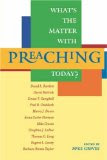 I just finished an interesting book last night called What’s the matter with Preaching Today? I had to read it for class and write a paper on it. It was very interesting. It’s book of essays by various famous preachers and teachers reflecting upon a famous article written by Harry Emerson Fosdick in 1928 called “What’s the matter with Preaching?” The article was published in Harpers (can you imagine them publishing that today?) Anyway, there were two essays in particular that I thought were really good.
I just finished an interesting book last night called What’s the matter with Preaching Today? I had to read it for class and write a paper on it. It was very interesting. It’s book of essays by various famous preachers and teachers reflecting upon a famous article written by Harry Emerson Fosdick in 1928 called “What’s the matter with Preaching?” The article was published in Harpers (can you imagine them publishing that today?) Anyway, there were two essays in particular that I thought were really good.
.
Fred. B.Craddock is from Vanderbilt. His essay championing the importance of memory was my favorite of the book. Hey says,
.
“There are two kinds of preachers out there. On the one hand we have those who are determined to recover and defend a lost past. Something vital has slipped away. In most cases that which has been lost sight of has to do with one formulation or another of sixteenth-century theology…On the other hand there are those who want to proclaim a living Christ, who is seeking to lead his people into a new and changing world…the Jews, by contrast, held to an open view of Scripture. Commentary was welcomed, so that ancient truth could be rendered meaningful in the present. Jesus told us that the Spirit would guide us into all truth. Good preaching will always strive to keep the future open.” 55
.
He notes that this style draws upon the deep resonances and natural longing of the human heart. Great preaching, for Craddock, gives voice to the questions we are all asking. He says that human memory is built upon cumulative experience throughout the ages as stories from our past shape the way we hear the gospel. Preaching, then, is not so much about repeating the story as it is remembering the story and trusting the listener will recognize it as the thing we’re all dying to hear. Although there may be a great distance between biblical history and contemporary culture, many human commonalities hold those two worlds together. If we can effectively tap into them, the listener will “volunteer themselves” (72) into our sermons. As preachers, we listen to the text for those resonances that we recognize in our people and in our common life together.
.
I like Craddock’s vision for preaching the most of any in this book. His emphasis on the role of memory and especially collective/progressive memory was a new concept for me. I also resonate deeply with his assertion that people in our congregations are asking very deep and important questions which we must voice and intersect with through our sermons. If we do this effectively we will not have to jump through hoops to get them to listen to us.
.
Barbara Brown Taylor wrote a chapter for the book as well. She asserts the problem is that preaching is seen as a solo performance instead of a corporate act rising out of community. She recommends a team approach to preparation. She says preachers wrestle in daylight what others only wrestle with in dark. Preaching skills alone are not enough to have an impact, she says, but will never replace the hands-on experience of the human condition. She reminds us that preachers must face their own demons before they can help others to do so. Preachers must be more interested in life than religion. God needs those who will give themselves fully to making peace, saving lives, and defending the defenseless. Her chapter was so good I need to read it again.












